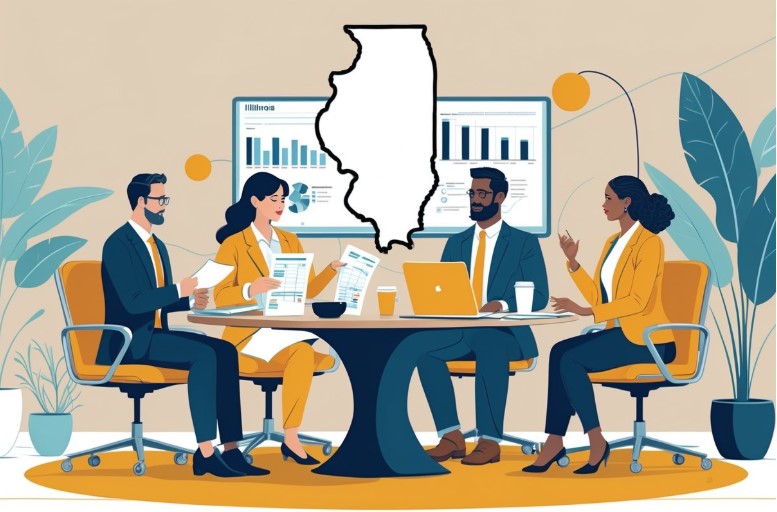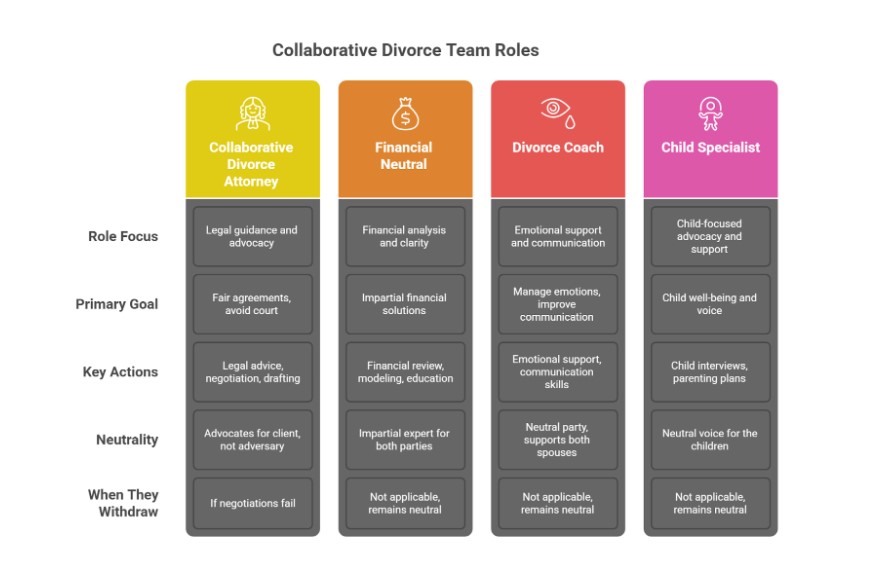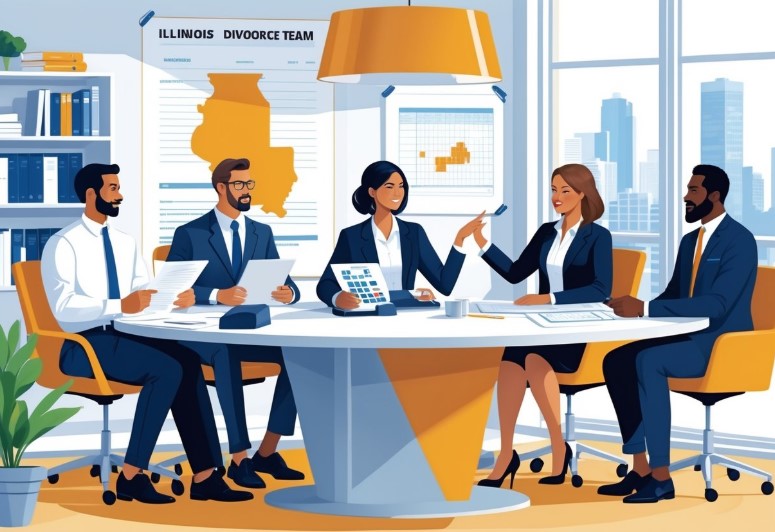In a collaborative divorce case in Illinois, several key professionals work together to support both spouses through a respectful and fair process.
Each team member has a specific role designed to help resolve family disputes with integrity and cooperation, avoiding the stress of court battles.
This team approach helps keep communication open and focused on the family’s needs rather than on conflict.
The main players include the divorce attorneys, who guide clients on legal rights and options while respecting their goals.
Mental health experts serve as coaches to help manage emotions and foster healthy communication between spouses.
Financial specialists help clarify money matters to ensure fair decisions.
Understanding who is responsible for what can make the process clearer and less overwhelming for families during a difficult time.
Key Takeaways
- Collaborative divorce in Illinois involves a structured team of professionals—including attorneys, a financial neutral, a divorce coach, and sometimes a child specialist—who guide couples through respectful, out-of-court resolutions.
- Each team member plays a distinct role: attorneys protect individual interests, the financial neutral clarifies financial matters, coaches manage emotions, and child specialists advocate for the children’s best interests.
- The team approach reduces conflict, confusion, and cost, making divorce more efficient and emotionally manageable for families.
What Is A Collaborative Divorce Team In Illinois?

A collaborative divorce team in Illinois is a group of professionals who work together to guide couples through a divorce using cooperation and open communication.
This team focuses on maintaining informal and respectful discussions to help families make informed decisions without resorting to court.
Why The Team Model Works
The team model is effective because it brings together experts from various fields to support both parties throughout the divorce process.
This typically includes collaborative attorneys, financial specialists, and mental health professionals, all of whom are trained in the collaborative divorce process.
Each member plays a distinct role: attorneys handle legal matters, financial experts explain assets and budgeting, and mental health professionals assist with emotional support.
This setup fosters open communication and cooperation, thereby reducing the conflict typically seen in traditional divorces.
Legal Basis For Team Involvement
In Illinois, the Illinois Collaborative Process Act governs the operation of collaborative divorce teams.
This law supports the use of alternative dispute resolution and protects the confidentiality of team communications.
Before starting, both parties sign a participation agreement that commits them to cooperate and share honest information.
This agreement also prevents court intervention if the collaborative process fails, encouraging everyone to work together fully.
The law underlines that collaborative divorce is a voluntary, team-based approach.
It ensures that all involved respect the process and focus on conflict resolution, making the entire experience more predictable and dignified for families.
Start your collaborative divorce the right way with Anna K Law. We’ll help build the ideal team for your situation. Contact us today to schedule your consultation.
1- The Collaborative Divorce Attorney

The collaborative divorce attorney plays a unique role compared to traditional divorce lawyers.
They focus on helping spouses work together, not fight each other.
This approach aims to make the process less stressful and more cooperative, guiding the couple toward solutions that fit their family’s needs.
Advocate, Not Adversary
A collaborative divorce attorney acts as an advocate who supports their client’s interests, but does not treat the opposing spouse as an adversary.
Instead of preparing for courtroom battles, they encourage open communication and cooperation.
They help clients understand their rights and options while promoting respectful dialogue.
Their goal is to find fair agreements without resorting to court disputes. This reduces conflict and maintains the confidentiality of the process.
Collaborative divorce lawyers in Illinois commit to working with both parties to reach peaceful resolutions.
If talks break down, the attorneys must withdraw from the case and cannot become opposing counsel, highlighting their role as problem solvers, not fighters.
What Your Attorney Does (And Doesn’t Do)
The collaborative divorce attorney guides clients through Illinois’ collaborative divorce process, ensuring that legal protections are in place.
They explain laws, draft agreements, and help resolve issues like property division, child custody, and support.
They also facilitate meetings and coordinate with other team members, such as mental health professionals.
This helps address the emotional aspects that affect decisions.
Unlike traditional divorce attorneys, collaborative divorce lawyers do not prepare for litigation.
If negotiations fail, they will stop representing their client, and the couple will need to hire new lawyers if they proceed to court.
This helps keep both parties committed to cooperation throughout the process.
2- The Financial Neutral
The financial neutral plays a crucial role in guiding both parties through the economic aspects of divorce.
They are impartial experts who analyze financial documents and help create fair options for dividing assets.
Their job helps avoid conflicts and keeps the financial process clear and balanced.
Who They Are
A financial neutral is a trained expert in finance and divorce-related money matters.
Often, they hold certifications such as Certified Divorce Financial Planner (CDFP) or Certified Divorce Financial Analyst (CDFA).
They work for both spouses equally, without favoring one over the other. They bring a deep understanding of taxes, investments, budgeting, and asset division.
Unlike other professionals hired by just one spouse, the financial neutral supports the collaborative team by providing objective advice. This helps keep negotiations respectful and focused on facts.
What They Do
The financial neutral reviews all financial documents for both parties, such as income statements, debts, savings, and investment accounts.
They identify all assets and liabilities involved in the divorce. They create clear financial models and options for fairly dividing property.
The neutral explains the financial impact of different settlement choices, including tax consequences and long-term effects on each party’s economic future.
This expert also offers education on how finances change after divorce.
Their goal is to help the couple make informed, balanced decisions together, rather than rely on one-sided information.
Why This Role Saves Money
By providing clear financial facts and options early, the financial neutral can prevent misunderstandings that often lead to costly court battles.
Their impartial advice reduces conflict over money.
They help both parties avoid expensive litigation by promoting agreements based on shared financial knowledge and expertise.
This speeds up the divorce process and lowers legal fees.
Using one expert for both sides also reduces duplicated costs from hiring separate financial consultants.
This makes the overall process more efficient and less stressful for everyone involved.
3- The Divorce Coach
A divorce coach plays a crucial role in helping both spouses navigate the emotional and practical challenges that arise during a collaborative divorce.
They focus on improving communication and maintaining emotional well-being throughout the process.
Their work supports healthier family relationships as the parties work toward agreements outside of court.
Emotional Management In The Process
Divorce coaches are trained mental health professionals who guide spouses in managing their emotions during the divorce.
They recognize that strong feelings like anger, sadness, and fear often affect how decisions are made.
The coach teaches coping skills to help reduce stress and assists each person in expressing their thoughts clearly.
By promoting calm and respectful conversation, the coach helps prevent conflicts from escalating.
This support can lead to more productive discussions, benefiting both individuals and their family relationships.
The coach’s role is especially valuable in maintaining emotional balance when disagreements arise.
Their Responsibilities
The divorce coach’s duties include listening to both spouses, identifying triggers that might cause tension, and teaching communication techniques.
They act as a neutral party, aiming to help each person feel heard and understood. This creates an environment that facilitates easier collaboration.
Additionally, the coach collaborates closely with attorneys and other professionals on the collaborative team.
They provide updates on emotional dynamics that might affect negotiations.
Their involvement helps keep the divorce process focused and respectful for everyone involved.
Not Therapy, But Strategic Support
Although divorce coaches are mental health experts, their role is not to provide traditional therapy.
Instead, they offer strategic support tailored to the divorce process.
They help clients develop emotional strength and problem-solving skills needed for negotiations and future co-parenting.
This approach is more solution-focused than traditional therapy, aiming to enhance decision-making and alleviate emotional roadblocks.
By clarifying feelings and goals, the divorce coach supports the family’s overall well-being while guiding them through the divorce steps.
4- The Child Specialist (If Applicable)
A child specialist plays a unique role in certain collaborative divorce cases, particularly when the needs of the children must be carefully addressed.
They help the family focus on what is best for the children during and after the divorce, working alongside parents and other team members.
Neutral Voice For The Child
The child specialist acts as a neutral voice focused solely on the children’s well-being.
They spend time meeting with the children to understand their feelings, fears, and hopes about the divorce.
This helps the child specialist gather an accurate picture of how the children are coping.
By staying impartial, the specialist avoids taking sides between the parents.
They represent the children’s interests clearly to the team.
This ensures the children’s views are part of discussions about parenting time and arrangements, which can lead to fairer decisions.
What They Contribute
The child specialist assists parents in creating parenting arrangements that support the children’s emotional and physical needs.
They guide parents in co-parenting plans that balance schedules and responsibilities in ways that reduce conflict.
The specialist also helps open communication channels through coaching or therapy for the children and parents.
Their insight into child development and trauma makes the plans more realistic and sustainable. This helps families move forward with less stress and more understanding.
Are you unsure which professionals you need for your collaborative divorce? Let Anna K Law help guide your team selection with clarity and care. Book your strategy call now.
How These Roles Work Together During The Divorce Timeline
The collaborative divorce team in Illinois plays a clear and organized role throughout the divorce process.
Each professional has a specific role, helping the couple move step-by-step from sharing information to finalizing settlement agreements.
This teamwork aims to facilitate smoother negotiations and minimize conflicts.
Month-By-Month Involvement
In the early months, the focus is on discovery, where both spouses share financial and personal information openly. The attorneys review this information to identify issues and prepare for negotiation.
During this time, a neutral mediator helps decide the main topics for discussion.
By the middle months, the team encourages interest-based negotiation to explore settlement options. The financial advisor gives input on budgets and future planning.
Child specialists may be involved if children are involved, ensuring that their emotional needs are considered in any divorce agreement.
In the final months, the lawyers draft legally binding settlement agreements based on what everyone agreed to. The collaborative coach supports clients emotionally, preparing them for a smoother transition to post-divorce relationships.
Coordinated Meetings Mean Less Conflict
Regular, scheduled team meetings bring everyone together—spouses, lawyers, coaches, and advisors. The professional mediator facilitates these meetings to ensure conversations remain focused and respectful.
This structure prevents misunderstandings and reduces emotional outbursts. The collaborative coach helps each person communicate calmly, which supports better negotiation.
When experts work side by side, the chances of reaching fair and balanced settlement agreements increase. This teamwork also helps avoid costly court battles, speeding up the settlement process and protecting family relationships.
What Happens If The Collaborative Process Fails?
If the collaborative process fails, the couple may need to switch to traditional litigation to complete their divorce. This means they file a divorce petition in court, starting the divorce litigation phase.
Litigation often involves more time, expense, and court involvement. In collaborative divorce, both parties and their attorneys agree to avoid court.
When the process breaks down, those attorneys must withdraw. The couple then hires new lawyers to represent them in the courtroom.
During litigation, a judge will oversee the case and may schedule a final hearing. This hearing resolves any issues that the spouses were unable to settle collaboratively.
Preparing for court can be stressful, and cases may take months or even years to resolve, depending on their complexity. Switching to traditional divorce means losing some control over decisions.
A judge makes the final rulings based on evidence and legal standards. This contrasts with collaborative divorce, where spouses attempt to reach agreements through negotiation without the involvement of a judge or court.
The move to litigation is often emotionally and financially difficult. Both parties have invested time and money in a collaborative effort that has not led to a resolution.
Maintaining respectful communication during this period can help reduce conflict and make the legal process smoother.
Choosing The Right Collaborative Professionals In Illinois
Selecting the right professionals is key for a smooth collaborative divorce in Illinois. Each person on the team must understand Illinois divorce law and work well with others.
This ensures practical solutions for financial, legal, and emotional needs. Careful selection helps avoid delays and extra costs.
Look For Certified And Trained Professionals
In Illinois, when considering collaborative divorce, choose professionals who have received proper training in collaborative law.
Certified collaborative lawyers are knowledgeable about Illinois divorce law and the specific rules governing collaborative cases.
Mental health experts and financial specialists should have experience with divorce and family issues. Verify if they have completed courses or certifications from recognized organizations, such as the Illinois Collaborative Alliance.
Professionals who stay updated on Illinois divorce new guidelines and teamwork skills bring more value. Their training helps maintain respectful communication and focuses on solutions that benefit everyone’s well-being.
Questions To Ask Before Hiring
Before hiring, ask about their experience with collaborative divorce cases in Illinois. For lawyers, questions include the number of collaborative cases they’ve handled and their success rate.
Mental health professionals should be asked how they support both spouses and children emotionally. It is important to know how they communicate with other team members.
Ask if they have worked well with financial experts, therapists, and child specialists. Also, clarify their fees and if payment plans are available.
Illinois couples deserve a divorce process that’s private, respectful, and child-focused. Anna K Law offers full-team support through every stage. Reach out to schedule your confidential consultation.
Frequently Asked Questions
Who is part of a collaborative divorce team in Illinois?
A collaborative divorce team typically includes two collaborative attorneys, a financial neutral, a divorce coach, and sometimes a child specialist, all working toward a mutual agreement.
What does a financial neutral do in an Illinois collaborative divorce?
A financial neutral gathers and analyzes financial documents, helps both spouses understand their assets and debts, and facilitates discussions about fair division and budgeting.
Is a divorce coach the same as a therapist?
No. A divorce coach is a trained mental health professional who helps manage emotions and communication during the divorce process but does not provide therapy or treatment.
When is a child specialist used in collaborative divorce?
A child specialist is brought in when issues related to parenting or custody arise. They give voice to the children’s needs and help parents create age-appropriate, child-centered parenting plans.
Can one attorney represent both spouses in a collaborative divorce?
No. Each spouse must have their own collaborative attorney. However, all attorneys are committed to non-adversarial, interest-based negotiation and cannot represent clients in court if the process fails.
Are collaborative divorce team meetings confidential in the state of Illinois?
Yes. Under the Illinois Collaborative Process Act, team meetings and communications are confidential and legally protected, fostering open and honest dialogue.


